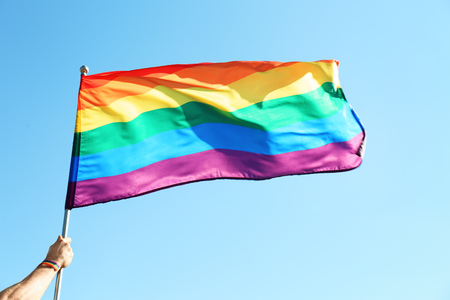LGBTQ acceptance in decline among US millennials — GLAAD

LGBT pride flag. Image: INQUIRER.net stock photo
A new survey released by GLAAD, a media monitoring organization dedicated to LGTBQ (Lesbian, Gay, Trans, Bisexual, Queer) advocacy, showed that young adults in the United States are less accepting of members of the community.
The Accelerating Acceptance Index, a national survey among U.S. adults, was conducted by The Harris Poll on GLAAD’s behalf and involved 1,970 U.S. adults aged 18 or older, 1,754 of whom classified as non-LGBTQ.
The latest index showed there has been a shift in millennial acceptance toward the LGTBQ community, from allies to detached supporters.
The index defined allies as non-LGBTQ supporters who were either “very” or “somewhat” comfortable in all LGBTQ-related interaction scenarios given. Meanwhile, detached supporters were defined as non-LGBTQ respondents whose comfort level varied across situations. The scenarios ranged from having LGBTQ members at one’s place of worship and seeing a same-sex couple holding hands to learning a family member is LGBTQ, among others.
Allies among non-LGBTQ 18 to 34 year olds were down to 45% in 2018, compared to 53% in 2017 and 63% in 2016. This was seen in both female and male respondents: female allies dropped to 52% from 64% in 2017, whereas male allies went down to 35% from 40% in 2017.
Article continues after this advertisementThere is also a decline in overall comfort when it comes to personal situations, which were divided into 4: learning a family member is LGBTQ, when one’s child is placed in a class with an LGBTQ teacher, when one learns that their doctor is LGBTQ and when one learns their child had a lesson on LGBTQ history in school.
Article continues after this advertisementThirty-six percent of non-LGBTQ young Americans were uncomfortable when it came to learning a family member is LGBTQ. About 33% said they were uncomfortable when their child is placed in a class with an LGBTQ teacher, whereas 34% said they were uncomfortable when they learned their doctor is LGBTQ.
Lastly, 39% of the respondents said they were uncomfortable when it came to learning their child had a lesson on LGBTQ history. The percentages for discomfort across the four aspects increased when compared to the results in 2017 and 2016, respectively.
Despite the decline in acceptance, the report showed that support for equal rights is stable, with majority of non-LGBTQ Americans (80%) strongly/somewhat agreeing to the statement, “I support equal rights for the LGBT community.”
GLAAD CEO and president Sarah Ellis said in the report that full acceptance of the LGBTQ community does not come from judicial decisions alone, but involves a culture that respects LGBTQ people.
“Closing the gap to full acceptance of LGBTQ people will not come from legislation on judicial decisions alone, but from creating a culture where LGBTQ people are embraced and respected,” Ellis said. “This year’s results demonstrate an urgent need for GLAAD to reach younger Americans with stories and campaigns that build acceptance.” JB
RELATED STORIES:
Catholic high school fires gay teacher to keep ties with archdiocese